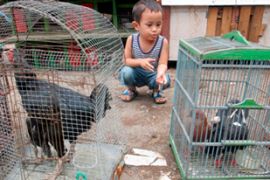Indonesia bird flu move criticised
Country has decided to stop sharing H5N1 virus samples with foreign laboratories.

CSL, the world top plasma products maker, said Indonesia’s action would slow the development of bird flu vaccines and cautioned that if other nations followed suit and withheld other seasonal flu samples, it would hinder the development of all vaccines.
Bird flu remains largely an animal disease, but can kill people who come into close contact with infected birds.
The disease has killed more than 160 people over the past four years, with Indonesia suffering the highest toll, 63.
‘System undermined’
Rachel David, CSL director of public affairs, said: “This action of Indonesia undermines the excellent system that the WHO has had in place for 40 years, whereby they sample flu strains and … distribute these strains to manufacturers.
“It has effectively protected the world’s population against catastrophic flu epidemics for half a century.
“If that is undermined by actions like this, regardless of what is motivating them, we will all suffer, all countries, because our access to effective flu vaccines will be slowed down.”
Non-profit decision
Aid agencies said that, while Jakarta‘s actions were reprehensible, its concerns and worries were valid and they were not confined to Indonesia alone.
Loretta Wong, chief executive of Aids Concern, a group dedicated to helping and securing treatment for people living with HIV/Aids, said: “People should be more sympathetic to public health issues.
|
“This is a global problem, not a local one, and should not be addressed by blaming the country that decided not to cooperate when they are treated unfairly” Suwit Wibulpolprasert, senior public health official, Thailand |
“After all, we are talking about human lives. One will not die not being able to watch pirated VCDs but one will die without access to affordable treatment.”
Indonesia‘s move struck a chord with Thailand, which recently voiced similar fears at a WHO meeting in Geneva.
Suwit Wibulpolprasert, a senior public health official in Thailand‘s ministry of public health said the Indonesian health minister was “wise”.
“Unless developing countries which are at the epicentre of the pandemic can be assured access to potential pandemic flu vaccines, they should not co-operate by sending out the viruses to the WHO.”
“Developing countries are having some doubts that the WHO may be used as a socially credible intermediary organisation to steal their viruses for commercial purposes.
“This is a global problem, not a local one, and should not be addressed by blaming the country that decided not to cooperate when they are treated unfairly.”
Intellectual property
Jakarta argues it has an intellectual property right to the country’s flu strain and to designate who develops a vaccine and profits from it.
Ian Barr, deputy director of laboratories at WHO’s influenza centre in Melbourne, said Indonesia‘s action may make it harder for it to access a vaccine to combat a future mutated virus.
He said: “If some new variant arises in the next year or 2 or 3 access might be difficult or have some restraints put on it and make vaccine development for any company very difficult.
“It may affect Indonesia itself in getting a vaccine.”